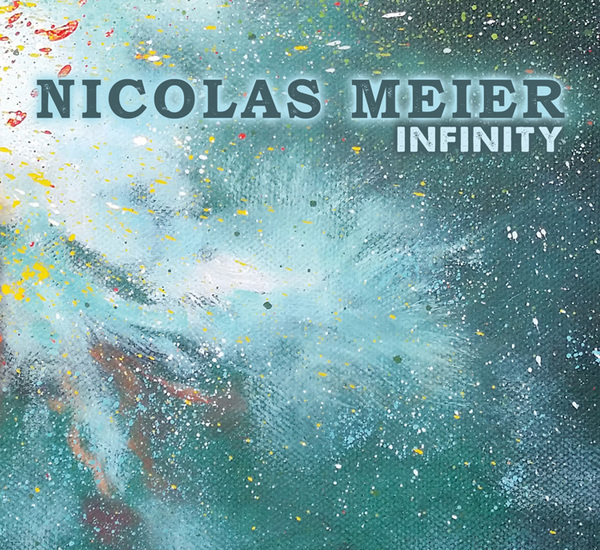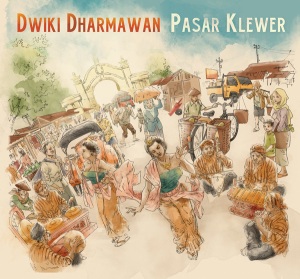Indonesian keyboard star Dwiki Dharmawan returns following his 2015 MoonJune Records debut, the more fusion-heavy So Far, So Close, with the even more ambitious Pasar Klewer. This vibrant, acoustic piano-driven two-CD set features the cream of Britain’s younger expat crop, blending with Indonesian musicians to create a passionate, seamless cultural cross-pollination.
Bassist Yaron Stavi and drummer/percussionist Asaf Sirkis form the core trio with Dharmawan, while reed multi-instrumentalist Gilad Atzmon, Gamelan musical virtuoso Aris Daryono and guitarists Nicolas Meier and Mark Wingfield all make significant contributions to several tracks. Italian singer Boris Savoldelli also guests on two tunes, including a reinvention of Robert Wyatt’s “Forest,” and the Jess Jegog Gamelan Orchestra and singer Peni Candra Rini bring cultural verisimilitude to Dharmawan’s radical rearrangement of the traditional “Lir Ilir.”
MoonJune Records’ Leonardo Pavkovic describes Dharmawan as “one of Indonesia’s most prominent musicians; a cultural icon in his homeland and accomplished pianist, keyboardist, composer, arranger, performer and peace activist. A true cultural ambassador of his beloved country, Dwiki has forged a very successful thirty-plus year career, performing in over sixty countries with solo and collective projects.”
So Far, So Close (2015) was Dharmawan’s pan-cultural, fusion powerhouse MoonJune debut, but for his second MoonJune effort, Dharmawan wanted to try something different. “Indonesia is the place of ‘ultimate diversity,'” the pianist says. “Here, the urban cultures accelerate the ‘acculturation’ process, which generates changes in cultural patterns and creates new forms of musical expression. Pasar Klewer is the answer to my search for ‘the difference,’ and also a valuable answer to our modern crises and urban uprooting. The album’s distinctive sound originates from an ancient Gamelan tonal system called Salendro, known in the Karawitan traditional music of the Sundanese, Javanese and Balinese. Based on the Gamelan tonal system, I also adapted, as my inspiration, other musical elements from all over the Indonesian archipelago, as well as the western diatonic system.”
Pasar Klewar’s exhilarating opening title track, indeed, possesses a microtonal-informed melody drawn unmistakably from Dharmawan’s cultural roots; but its modal nature also affords the pianist and his band mates the freedom to explore everything from Metheny-esque landscapes (though Wingfield’s heavily overdriven electric guitar provides a completely non-Metheny vibe during his light-speed solo) to a mid-song shift in mood, where Stavi and Sirkis drive Dharmawan’s post-Coltrane, Tyner-via-Beirach-through-Corea exploration of spiritual freedom with similar passion and fire.
Daryono takes an impressive vocal/rebab (three-stringed violin) solo before some empathic three-way interplay amongst the core trio leads to a thoroughly musical drum solo reaching deep into the heart of the song before Stavi and Dharmawan re-enter, bringing this twelve-minute epic to a finish with another brilliant piano solo of grand proportions. Cross-pollinated with Wingfield’s additional fiery interaction, the music builds to such a climactic peak that, when it suddenly comes to a stop, the band members shouting “Yeah!!” is left to conclude the track, reflecting the energy clearly felt in the studio.
Its overall freedom may come as a surprise to fans of the more easily digestible So Far, So Close…though that’s not to suggest Pasar Klewar is lacking in beauty, flat-out lyricism or eminent appeal. “Interaction with each other is very important, as each musician contributes an energy that then coalesces into an explosion of energy together,” enthuses Dharmawan. “It is not always easy for me to achieve my musical journey’s goal, but I always enjoy the process of the search. So Far, So Closerepresented my musical passion as a young, growing musician; now I feel more mature in exploring my musical inspirations…and I think that this is will be never-ending journey.”
If So Far, So Close and even more ambitious Pasar Klewar are any indication, then this is very good news for those fortunate enough to be hearing this remarkable Indonesian artist and a group that may have come together for the very first time in the studio to play Dharmawan’s music, but came ready-made with the intrinsic chemistry so important to music this intuitive/interpretive. If there’s any justice in the world, the name Dwiki Dharmawan will soon be on the lips of jazz fans around the world and Pasar Klewar the album that turned this Indonesian star into an internationally renowned jazz figure.
DWIKI DHARMAWAN – acoustic piano




